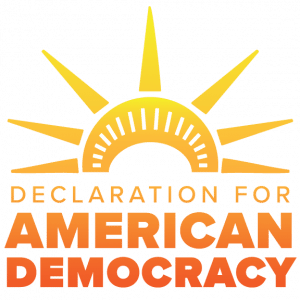This Week in 200 Words
In state updates, an Alaskan court ordered the state to impose limits on political donations, potentially creating an opportunity for the U.S. Supreme Court to revisit its Citizens United decision in the future. Cities across California are switching to district-based elections in response to lawsuits claiming the current at-large system dilutes minority votes. The Democratic Party filed a lawsuit over Georgia’s alleged mishandling of absentee ballots in the 2018 midterm elections. 18 Florida residents with felony convictions cleared the final hurdle to have their voting rights restored.
In other news, some Democrats see campaign finance, ethics, voting rights and lobbying law reforms as a winning issue for the party. Rep. Mikie Sherrill (D-NJ) introduced the Election Technology Research Act of 2019. A new report emphasized the importance of the Election Assistance Commission in overseeing the security certification of voting machines. The FBI has strengthened its procedures for informing Congress, state governments, and the public about foreign interference in U.S. elections. Universities across the nation are feeling the impact of new laws that restrict student voting, raising concern about student vote suppression.
National News
Roll Call – Some Democrats see political system overhaul as winning 2020 issue
If Rep. Max Rose’s voters expected the freshman lawmaker from Staten Island, New York, to quiet down this election cycle about a major overhaul of the nation’s political system, they were mistaken. It was a centerpiece of the Democrat’s campaign-trail mantra in 2018. And now, as one of the most vulnerable incumbents in Congress, he’s not stopping. Neither are many of his similarly situated colleagues.
Insider NJ – Rep. Sherrill Leads Bipartisan Election Security Bill
This bipartisan bill will give the National Institute of Standards and Technology (NIST) and the National Science Foundation (NSF) new resources to conduct research to promote the security and modernization of U.S. voting systems.
“I’m introducing this bill with my colleagues to help states arm themselves with strategies to prevent interference and the resources and support to ensure voting systems are reliable and secure.”
Washington Post – Report: Election vendors are ‘prime targets,’ need oversight
The private companies that make voting equipment and build and maintain voter registration databases lack any meaningful federal oversight despite the crucial role they play in U.S. elections, leaving the nation’s electoral process vulnerable to attack, according to a new report.
The Brennan Center for Justice on Tuesday issued the report, which calls on Congress to establish a framework for federal certification of election vendors.
New York Times – Spy, Law Enforcement Agencies Step Up U.S. Election Security Measures
The FBI has already given some American election candidates “defensive” briefings on evidence U.S. agencies collected of possible election interference, an FBI official told a briefing for journalists. An FBI official added that the bureau has “invested a lot of time” in trying to help social media companies detect inauthentic politically related message traffic, and shares information on this with social media companies.
New York Times – The Student Vote Is Surging. So Are Efforts to Suppress It.
After decades of treating elections as an afterthought, college students have begun voting in force. Their turnout in the 2018 midterms was more than double the rate in the 2014 midterms, easily exceeding an already robust increase in national turnout. Energized by issues like climate change and the Trump presidency, students have suddenly emerged as a potentially crucial voting bloc in the 2020 general election. And almost as suddenly, Republican politicians around the country are throwing up roadblocks between students and voting booths.
State Updates
Alaska – Common Dreams – ‘Historic’ Alaska Ruling Could Provide Roadmap to Defeating Citizens United
Anchorage Superior Court Judge William F. Morse ordered the state to impose limits on donations to political groups in Alaska, saying in the ruling that the Alaska Public Offices Commission (APOC), which handles election enforcement, “should reinstate enforcement of the contribution limits at issue.” The decision is expected to head to the Alaska Supreme Court.
California – Mercury News – Santa Clara, in the middle of court appeal, considers another change to district elections
Cities across the state are shifting from at-large to district elections, after threats of lawsuits under the California Voting Rights Act. The 2002 law requires local governments to change from at-large to district elections if minority groups can prove racially polarized voting, or that certain racial or ethnic groups have historically voted as a bloc to elect preferred candidates.
Georgia – New York Times – Lawsuit Challenges Absentee Ballot Rejections in Georgia
The Democratic Party filed a lawsuit Wednesday over Georgia’s handling of absentee ballots a year after some ballots were rejected for minor reasons such as signatures not exactly matching those on file with the state.
According to the federal lawsuit, absentee voters are not notified of problems with their ballots in a standard way or given enough time to correct them.
Florida – New York Times – ‘A Proud Day’: Ex-Felons Clear Final Hurdle to Vote
A year ago, Florida voters overwhelmingly approved a ballot measure known as Amendment 4, restoring the voting rights of up to 1.5 million people with felony records. But earlier this year, the Republican-controlled State Legislature imposed restrictions requiring former felons to first pay back outstanding legal financial obligations. In some cases, those amount to tens of thousands of dollars.
The restrictions imposed by the Legislature were challenged in court, and a federal judge decided last month to temporarily block the law, at least for the 17 plaintiffs in the lawsuit who said they could not afford to pay their legal debts.

